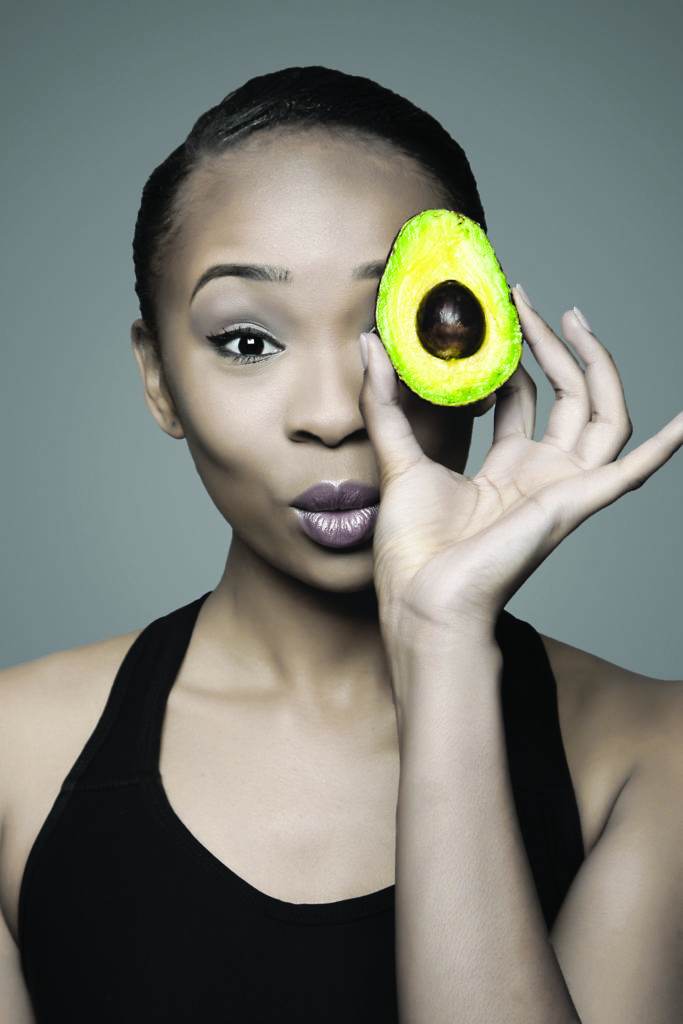A Holistic View of
Food Disparities in the
Black Community
BY CHEF MIMI WITH CONTRIBUTIONS
BY DARLING TIARA
Ididn’t know my food choices qualified my blackness. I learned that swift lesson when I showed up on the first day of 4th grade with an ugly avocado sandwich. The brown wheat bread. The spider-like bean sprouts. The creamy green stuff in the middle inspired a lot of “What is that?” accompanied by frowns. My classmates asked me, “What, you don’t eat meat?” and with a look of concern wanted to know if I thought I was white. Apparently Blacks didn’t eat THAT.
Raising me vegetarian was probably one of the healthiest choices my parents made for me but it did nothing for my social capital at the time. Black kids were supposed to prefer Wonder Bread, junk food, and fried chicken. So was I Black?
As a nine-year-old I went to school that day nervous and excited about meeting new people but left questioning my cultural identity. Over time I found out that everything associated with advancement outside of sports and entertainment was deemed by my peers as “acting white.” How could “being healthy” be inherent to one race? Why didn’t people of color have access to the same things? I felt alien and perplexed amid my own people. Defending my palate went along with defending my blackness.
My childhood made me want to learn more about food and eventually I went to culinary school. I was determined to become a chef and not just a soul food cook. I was one of two Black chefs in my program and felt an affinity for African and Indian preparations that I had learned to appreciate despite that fact that European cuisine was the industry standard. These foreign flavors more accurately represented me and my culture. Nevertheless, the culinary world and its schools seemed to cater to the whites only crowd.
As a working mother I needed income to provide for my children so I worked a double shift as a chef and as an advocate through Alameda County’s Public Health Department. In my job I went on many home visits throughout East and West Oakland to help educate at-risk low-income women of color, many of whom were pregnant or parenting young children, on proper nutrition and parenting. These experiences gave me deep insight into the negative food messages perpetuated throughout low-income communities.

I learned about “candy houses”—homes that function as makeshift stores where kids in the neighborhood can buy candy, soda, Top Ramen, donuts, and the world’s most unhealthy processed foods. Many of the mothers came to be known as “candy ladies” as they effectively supplemented the family’s income. This fascinated me because it showed entrepreneurial prowess though it bothered me that it was by proliferating candy and junk food. Why couldn’t the tables be decorated with fresh fruits, veggies, and soul-nourishing foods? Did they not know the processed junk they sold was toxic to their communities? Like junk to junkies? I had a host of questions and started to formulate my own answers and solutions:
Black families are constantly bombarded with images of processed foods. They are surrounded by food swamps—corner stores, gas stations, and fast-food outlets.
There is little to no representation of Black chefs cooking real wholesome food in their communities. Most Black restaurants and chefs bear the stigma of cooking only fried chicken, soul food, and BBQ.
Kids of color look up to sports figures and hip-hop stars, only to find their heroes in advertising images glorifying eating fast food. This promotes food-related disorders and epidemics such as obesity, diabetes, and cardio-vascular disease.
Big business pours millions into such food swamps and profits by pushing unhealthy food into vulnerable and susceptible communities.
No wonder Black people suffer the worst health issues in America! For this to change we must ask ourselves, “Who will represent the underrepresented?”
The importance of Black chefs and health advocates is greater than ever. There is a famous quote that says, “Systems and organizations don’t change people. People change people.” Often health programs designed outside the community barely accomplish a minimum. What benefit can be expected from handing out a flyer that says Eat 5 fruits and vegetables daily? Flyers will not alter an entrenched lifestyle. The shift will happen when a community has its own people creating cultural norms that say “It’s okay to be Black and eat avocado sandwiches.” Eating healthy isn’t a race thing, it’s a survival thing. It’s about a quality of life that isn’t exclusive to white people.
We must reclaim our diets and create a cultural shift so no little Black boys or girls have to feel like they aren’t Black simply because of food choices. As for me, I have decided to be that change by entertaining, educating, and calling for action. By showcasing Black chefs, I am trying to shift a trend that is traditionally reserved for Europeans and white Americans. Flavor, dedication, and expertise are on my menu. What do you bring to the table?
Chef Mimi is the creator of Bringing It to the Table, the first cooking competition and hottest food social pop-ups featuring African American chefs. See BittShow.com. Darling Tiara can be found on Instagram at darlingtiara.